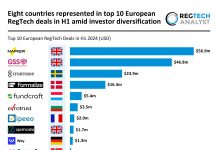A recent roundtable discussion hosted by Encompass Corporation, brimming with insights on KYC automation, has offered valuable perspectives on the evolving KYC landscape.
This event, hosted in November at the historic The Ned in London, united fourteen leading professionals in the field of KYC automation within the banking sector.
The roundtable highlighted the pivotal role of data in enhancing KYC processes. Industry experts emphasized the importance of a strategic approach to external data sourcing and the necessity of matching external data with internal databases. The consensus was clear: understanding the risk associated with each data attribute is key, as not all data carries equal weight in KYC procedures.
Professionals at the event discussed the significant challenge of creating a “golden record” – a unified and accurate customer profile. This difficulty stems from disparate customer truths across a bank’s branches and the complexities of reconciling profiles across different jurisdictions. Attendees also touched upon the potential need for client conversations to achieve accurate customer information.
While recognizing the complexities in automating periodic reviews, the group discussed the concept of perpetual KYC (pKYC). An event-based model was proposed, focusing on real-time responses to changes in KYC risk indicators, as opposed to a comprehensive automation model. This approach aims to streamline data review processes by concentrating efforts only on scenarios with significant changes.
The conversation also turned to the heavily manual process of managing KYC email-to-case management. The adoption of out-sourced portals was debated as a means to reduce processing times. The effectiveness of these portals was recognized in retail banking environments, but their adoption in corporate and commercial banking remains limited.
The roundtable advocated for a tiered approach to automated KYC, suggesting customization based on customer risk profiles and characteristics. For high-risk customers, a more personalized approach is recommended, while low-risk profiles could be managed through full automation, reducing the need for direct human intervention.
Finally, discussions underscored the importance of KYC automation in driving future revenues and business benefits, not just cost reduction. Efficient KYC processes are critical for winning business, particularly in RFP processes with global corporate clients. Challenges such as budget cuts, workforce changes, and increased regulatory demands have impacted the KYC landscape, with the average time for periodic reviews now ranging between 79 and 85 days.
Want to read the full post? Click here.
Copyright © 2024 RegTech Analyst
Copyright © 2018 RegTech Analyst






